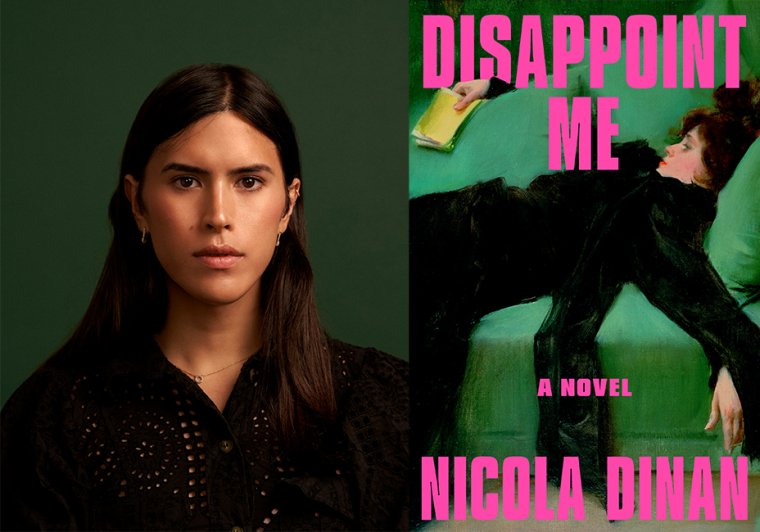This week’s installment of Ten Questions features Nicola Dinan, whose novel Disappoint Me is out today from the Dial Press. Disappoint Me follows thirty-year-old Max, who is plagued by a deep dissatisfaction following a lifetime of dysphoria and exes rattling around in her head. She wonders why these aren’t the best years of her life, and decides to make some changes, beginning with an attempt at heteronormativity. Max thinks she finds the answer in Vincent, though his corporate colleagues, traditional friends, and Chinese parents never imagined their son dating a trans woman. Still, Max feels that Vincent cares about her in a way she’d always assumed was a naïve fantasy. However, as Max discovers Vincent’s baggage and a decades-old entanglement resurfaces, she must reckon with the true meaning of forgiveness. Disappoint Me is an exploration of love, loss, trans panic, race, millennial angst, and the familial and romantic relationships that shape our lives. Torry Peters says, “Dinan writes like some kind of demigod. Her fictions make thinkable new realities for how we live and what we might expect from each other.” Nicola Dinan grew up in Hong Kong and Kuala Lumpur and now lives in London. Bellies (Hanover Square Press, 2023), her debut, won the Polari First Book Prize, was shortlisted for the Diverse Book Awards and Mo Siewcharran Prize, was a finalist for a Lambda Literary Award, and was longlisted for the Gordon Burn Prize and Brooklyn Public Library Book Prize.

Nicola Dinan, author of Disappoint Me. (Credit: Stuart Simpson)
1. How long did it take you to write Disappoint Me?
There were probably around three years between putting pen to paper and having the final draft. It’s hard to know how much of that time I was actually writing, especially since I was also editing my first novel during this time, as well as working on a draft of my third. But so much of the work is done in those gaps, when the book sits in the back of your mind with your subconscious untangling it.
2. What was the most challenging thing about writing the book?
Expectations! I set them higher for my second novel, which was a recipe for feeling like a failure a lot of the time. I work through a lot of these emotions in the book. Max is a poet, rather than a novelist, but when you meet her at the start of Disappoint Me she’s reeling from publishing a poorly received book of poetry. Part of writing this storyline was reconnecting with why I love writing, rather than focusing on success.
3. Where, when, and how often do you write?
I write on the dining table in my living room, which gives me enough space to stretch out. I’ve gotten much better at work hygiene, and by this I mean not working from bed (gross!), not working on weekends (most of the time!), and not working on holidays (please stop e-mailing me!). I try to set boundaries with myself, but I struggle to be strict. I tend to work best in the mornings, so that’s when I do most of my writing. If I’m working on a new project, I call it a day when I get to a thousand words, which sometimes takes an hour and on other days takes five.
4. What are you reading right now?
I’m four issues behind on my subscription of the Paris Review so I’m chomping through those. I just read a fantastic short story in the Winter 2024 issue called “Camouflage” by the Palestinian writer Adania Shibli. I’d recommend her novel Minor Detail (New Directions, 2020).
5. Which author, in your opinion, deserves wider recognition?
I really loved Happiness Forever (Farrar, Straus and Giroux, 2025) by Adelaide Faith, and hope its readers find it.
6. What is the biggest impediment to your writing life?
I think, like most writers, it’s security. I’ve been really lucky with my publishing journey so far, but being a writer still means abandoning more structured and traditional forms of progression in a career, and that can be really difficult. I think when looking at the creative process, it’s easy to fetishize hardship, but at the end of the day a writer still needs a room of one’s own. I wonder what we’d be free to create if we didn’t have to worry so much.
7. What is one thing that your agent or editor told you during the process of publishing this book that stuck with you?
Stop comparing yourself to other writers.
8. If you could go back in time and talk to the earlier you, before you started Disappoint Me, what would you say?
I wouldn’t! I learned so much from writing Disappoint Me, even the hard stuff. I feel like I’d be robbing myself of those lessons if I went back and said anything to myself. To be honest, I’ve never fared well with time-travel plots.
9. Outside of writing, what other forms of work were essential to the creation of Disappoint Me?
A lot of writing is living. I write contemporary novels, and this obviously involves some experience of contemporary life. It’s counterintuitive, because being a writer is a really insular and isolated profession. There’s a writerly cliché of saying “Oh, well, it’s material!” after going through something traumatic, but this isn’t what I mean at all. Sure, that can be part of it, but I’m talking about getting out into the world, speaking to people, looking at art, learning new things.
10. What’s the best piece of writing advice you’ve ever heard?
Stop comparing yourself to other writers!







